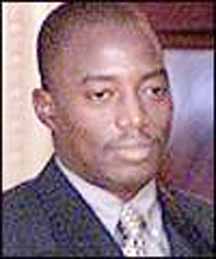KINSHASA, (Reuters) – The main challenger in Democratic Republic of Congo’s election declared himself president yesterday and poured scorn on provisional official results handing victory to the incumbent, Joseph Kabila.
Clashes broke out between tyre-burning protesters and security forces in the mostly pro-opposition capital Kinshasa and fears mounted that a post-election dispute would reignite conflict in the war-scarred central African state.
The head of the electoral commission said yesterday Kabila won nearly 49 percent of the votes to his rival Etienne Tshisekedi’s roughly 32 percent, results that an observer group later said appeared suspicious.

Electoral commission chief Daniel Ngoy Mulunda called for calm. “(The results) are no reason to whip up the population against the established order to contest the results, or to settle scores,” he told officials and diplomats gathered to hear the results.
Tshisekedi said he rejected Kabila’s victory and considered himself the newly elected leader of Congo.
“I consider these results a real provocation of the Congolese people,” he said in an interview on RFI radio. “As a consequence, I consider myself, from today, the elected president of the Democratic Republic of Congo.” Opposition supporters burned tyres in parts of Kinshasa, a sprawling city of 10 million, and chanted Tshisekedi’s campaign slogan, “the people first”. A U.N. source said there had been clashes with security forces and reports of shooting.
Gunfire erupted in Mbuji Mayi, an opposition stronghold in the south of the country, an hour after Kabila was named winner, a local civil society leader said. “We can hear gunshots everywhere, it’s still going on,” he told Reuters. Celebration broke out in other parts of the country. At least 18 people have been killed in election-related violence so far, according to U.S.-based Human Rights Watch, as opposition protesters took to the streets alleging the government was attempting to rig the vote.
The Nov. 28 poll was Congo’s first locally organised presidential contest since a war that killed more than 5 million, and is meant to move the country towards stability and encourage investment after years of conflict and turmoil.
Government Communica-tions Minister Lambert Mende said Tshisekedi’s self-declaration as president was “nonsense and illegal” and warned that it could spark violence.





